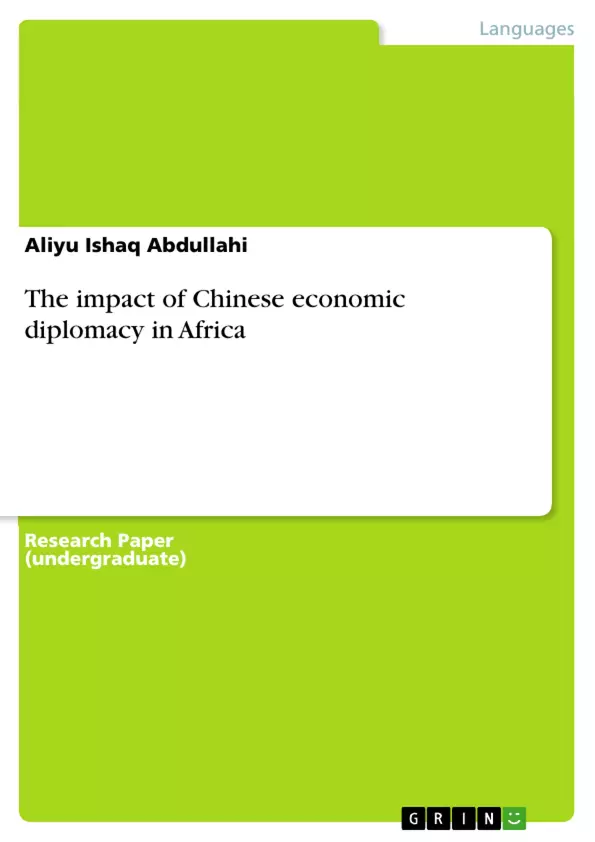This research therefore seeks to explore the impacts of china’s economic diplomacy in Africa, in order to seek whether there are linkages with economic growth in Africa. This is because of direct involvement of Chinese citizens in meager business venture that are otherwise associated with poor and middle class people such as hawking and retailing. At the same time, local contractors are losing in situations where contracts are awarded at the inter-government level. Regionally, countries in Africa are losing their selling power in the textile industries because of the entry of the Chinese products as well as Chinese citizens who are willing to engage in small enterprises that are generally of the poor and the middle class people in Africa. This means that Chinese economic diplomacy have a direct impact on individual livelihoods. There is need to examine in emerging effects of china economic diplomacy with Africa.
The study therefore has the following Research Question
i. What is the impact of Chinese economic diplomacy in Africa?
ii. What is implication of Chinese economic diplomacy for Africa countries?
iii. How can china’s economic diplomacy improve the economic well-being of African countries?
Inhaltsverzeichnis (Table of Contents)
- CHAPTER ONE
- 1.1 Introduction
- 1.2 Statement of Research Problem
- 1.3 Objective of the Study
- 1.4 Significance of the Study
- 1.5 Theoretical framework
- 1.6 Methodology of the Study
- 1.7 Scope and Limitation of the Study
- 1.8 Definition of key Concept
- 1.9 Organization of the Chapters
- CHAPTER TWO
- 2.0 Introduction
- 2.1 Conceptual Analysis
- 2.2 THEORETICAL FRAMEWORK
- 2.3 Political influence of Chinese Economic Diplomacy
- 2.4 Criticism of Chinese Economic Diplomacy
- 2.5 Shortcomings of the Literature Review
- CHAPTER THREE
- 3.0 Historical background of the study area
- 3.1 What are the Origins of China's Economic Diplomacy on the Economic Fruit?
- 3.2 What are the Factors that Shape the Development of China's Economic Diplomacy?
- 3.3 What is the Impact of Such Diplomacy in the International Stage?
- 3.4 What does this imply for China's status in contemporary international politics?
- CHAPTER FOUR
- 4.0 Introduction
- 4.1 The influence of China's Economic Diplomacy in Kenya
- 4.2 The influence of China's Economic Diplomacy in Ethiopia
- 4.3 The influence of China's Economic Diplomacy in Democratic Republic of Congo
- 4.4 Summary of the chapter
Zielsetzung und Themenschwerpunkte (Objectives and Key Themes)
This research explores the impacts of China's economic diplomacy in Africa, aiming to investigate potential linkages with economic growth in the continent. The study aims to assess the level of Chinese economic diplomacy on African countries, examine its impact on African countries, and analyze its implications for Africa.
- The impact of Chinese economic diplomacy in Africa.
- The implications of Chinese economic diplomacy for African countries.
- The potential of China's economic diplomacy to improve the economic well-being of African countries.
- The effectiveness of Chinese economic diplomacy in Kenya, Ethiopia and Congo DR.
- The theoretical framework of China's involvement in Africa from a realist perspective.
Zusammenfassung der Kapitel (Chapter Summaries)
Chapter One introduces the concept of economic diplomacy, highlighting China's growing economic power and its resulting foreign policy objectives. It emphasizes the importance of China's economic diplomacy in achieving those objectives through bilateral economic relations with the rest of the world.
Chapter Two delves into the literature review, providing a conceptual analysis of Chinese economic diplomacy, exploring its theoretical framework, and examining the political influence and criticism surrounding it. The chapter concludes by identifying shortcomings in the existing literature.
Chapter Three presents the historical background of the study area, examining the origins, factors shaping the development, and impact of China's economic diplomacy on the international stage. It also analyzes the implications of such diplomacy for China's status in contemporary international politics.
Chapter Four explores the influence of China's economic diplomacy in three specific African countries: Kenya, Ethiopia, and the Democratic Republic of Congo. It analyzes the specific ways in which Chinese economic diplomacy has impacted these countries.
Schlüsselwörter (Keywords)
This research focuses on the impact of China's economic diplomacy on Africa, exploring the relationship between economic diplomacy and economic growth. Key terms include Chinese economic diplomacy, African countries, economic impact, bilateral economic relations, realist perspective, political influence, and the balance of power.
Frequently Asked Questions
What is the central research question of this study?
The research explores the impact of China's economic diplomacy in Africa and its implications for the economic well-being and growth of African countries.
Which specific African countries are analyzed?
The study focuses on three specific case studies: Kenya, Ethiopia, and the Democratic Republic of Congo.
What are the negative impacts mentioned regarding Chinese involvement?
Issues include local contractors losing government contracts, the decline of local textile industries, and Chinese citizens competing in small-scale retail businesses like hawking.
What theoretical framework is used in the research?
The study analyzes China's involvement in Africa primarily from a realist perspective of international relations, focusing on power and influence.
How does Chinese diplomacy affect individual livelihoods in Africa?
By engaging in meager business ventures typically associated with the poor and middle class, Chinese economic diplomacy has a direct and sometimes disruptive impact on individual livelihoods.
What are the origins of China's economic diplomacy according to Chapter Three?
Chapter Three examines the historical background, identifying the factors and origins that shaped China's current status in contemporary international politics.
- Citation du texte
- Aliyu Ishaq Abdullahi (Auteur), 2016, The impact of Chinese economic diplomacy in Africa, Munich, GRIN Verlag, https://www.grin.com/document/504151



